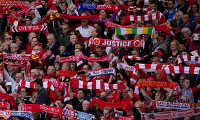




The Guardian
http://www.theguardian.com/uk-news/2014/dec/17/hillsborough-disaster-police-masonic-conspiracy
Masons colluded, Hillsborough court told
Police constable tells inquest representing 75 victims’ families he did not come forward about masonic meeting earlier for fears over his job
Wednesday, 17 December, 2014
David Conn

Commemoration at Anfield stadium marking 25 years since the Hillsborough disaster, in which 96 people died. Photograph: Christopher Thomond for the Guardian |
Maxwell Groome, a constable at the time, said that after the disaster at the FA Cup semi-final between Liverpool and Nottingham Forest at Sheffield Wednesday’s football ground, “the word” inside the force was that freemason officers held a meeting to blame superintendent Roger Marshall.
Groome said he heard that the meeting took place in portable cabins at South Yorkshire police’s area office, and was attended by Chief superintendent David Duckenfield, who had commanded the match.
Questioned by Michael Mansfield QC, representing 75 families whose relatives were killed at Hillsborough, Groome said he believed Duckenfield was “a grandmaster of a particularly influential lodge” – the Dore lodge in Sheffield.
Groome also told the inquest that senior officers pressured junior officers to change their statements after the disaster, because they were “terrified” of criticism of the force’s command. He said he was “duped” into agreeing to the changes, because he believed if he did not, he would never be called to give evidence to Lord Justice Taylor’s official inquiry or to the first inquest, and his statement would be “magicked away, dumped in a box, never to see the light of day again”.
Groome said a colleague, PC Brookes – whose first name was not given in court – called the inquiry team at West Midlands police to complain it was “a masonic conspiracy”.
Groome said Brookes told him West Midlands police asked if he could prove the conspiracy. Brookes told them he couldn’t, and Groome said they concluded it would not be investigated.
Asked why in earlier accounts about the events of the day he did not include the rumoured meeting of freemason officers, Groome replied: “Basically, I’d have been committing professional suicide.”
Marshall, who was in command outside the Leppings Lane turnstiles at Hillsborough, had requested a large exit gate to be opened, to alleviate a crush of Liverpool supporters outside the ground, and allow a large number in. The jury has heard that police did not close off a tunnel inside, which led to the Leppings Lane terrace’s crowded central “pens”, that many of the incoming fans headed down it, and the lethal crush happened in those pens.
Groome said he subsequently heard of the meeting between senior officers, said to have included Duckenfield, superintendents Roger Greenwood and Bernard Murray, Inspector Steven Sewell and Chief inspector David Beal.
“Being unable to prove it, I believe that most of them were masons,” he said.
The coroner, Lord Justice Goldring, sent out the jury of seven women and four men to allow legal discussions after Groome gave his evidence about the freemasons’ meeting. At the end of the day, the coroner referred the jury to “evidence of a meeting said by Mr Groome, on the basis of rumour, to have taken place on the morning of April 16”.
Goldring told them: “I should say this quite clearly to you: we have no other evidence than this rumour, said to emanate from the [South Yorkshire police] area office. It amounts to no more than what the witness described as ‘scuttlebutt’.’”
Groome, who on the day helped Liverpool supporters carry one of the 96 victims, Colin Wafer, 19, on an advertising hoarding being used as a makeshift stretcher, said the police operation as the disaster unfolded was “chaotic”. The inquest was shown Groome’s original statement – typed “recollections” made on plain paper after the event. He said officers were told not to write their accounts in their official police pocketbooks. Groome’s criticisms, which were removed in handwritten amendments after he submitted the statement, included a comment that “certain supervisory officers were conspicuous by their absence”.
Asked by Jonathan Hough, counsel for the coroner, to whom that comment was referring, Groome replied: “Duckenfield”.
Groome had also written: “The control room [where Duckenfield was in command] seemed to have been hit by some sort of paralysis.”
Other criticisms he made in his statement, which were also deleted, included the decision not to delay the match’s 3pm kick-off; reductions in police manpower; staffing of the control room; that “too many officers were sitting around in the gymnasium” and pointed to the removal from command at Hillsborough of the experienced officer, Chief superintendant Brian Mole. The jury has heard that Mole was replaced on 27 March 1989, 19 days before the semi-final which 54,000 people would attend, by Duckenfield, who had never commanded a match at Hillsborough before.
Groome subsequently signed a typed up version of his amended statement, he says, because he feared that it would not see the light of day otherwise.
The “main thrust” of the pressure to change his statement was, Groome said: “They were terrified of junior officers criticising senior officers and therefore, in their eyes, undermining the command structure of South Yorkshire police.”
The inquests continue.
Further Reading:
Britains Masonic Scandal, have the 'Brethren' finally met their Waterloo?